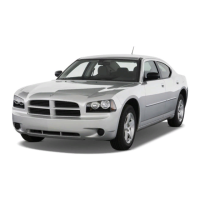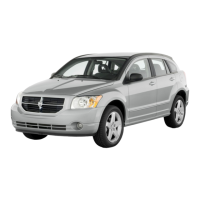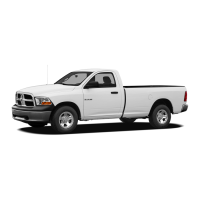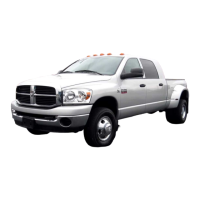Do you have a question about the Dodge 2009 Dakota and is the answer not in the manual?
Explains how to navigate and use the owner's manual effectively for information retrieval.
Details important warnings and cautions to ensure safe vehicle operation and prevent damage.
Provides information on the location and importance of the Vehicle Identification Number (VIN).
Discusses the effects of vehicle modifications on safety, roadworthiness, and potential risks.
Information about vehicle keys, key codes, and ordering duplicate keys from the dealer.
Information about the Sentry Key system that prevents unauthorized vehicle operation by disabling the engine.
Explains the system for locking/unlocking doors and activating the panic alarm using an RKE transmitter.
Comprehensive guide to the vehicle's restraint systems, including seat belts and airbags.
Explanation of the SRS system, including driver and passenger front airbags and their function.
Guidelines and recommendations for using child restraint systems appropriate for children's age and weight.
Recommendations for breaking in the engine during the initial period of vehicle operation.
Information about the inside day/night mirror and outside mirrors, including adjustment and folding features.
Instructions on operating power mirror controls located on the driver's door trim panel.
Overview of the UConnect system for voice-activated, hands-free mobile phone communication.
How the Voice Recognition System (VR) allows control of the radio, disc player, and memo recorder.
Information on seat adjustments, including manual and power seat features.
How to raise or lower the steering wheel into a desired position and lock it in place.
How to use the electronic speed control system (cruise control) to maintain a set speed.
Information about the HomeLink system for operating garage doors and other devices.
Overview of the various instruments and controls located on the vehicle's instrument panel and console.
Detailed description of each component and indicator within the instrument cluster.
Information on the electronic digital clock, including its display and setting procedures.
Information on the RER/REN multimedia system, including its radio, CD/DVD, USB, and HDD features.
How to operate the UConnect system for hands-free phone calls and its features.
Shows the level of fuel in the fuel tank when the ignition switch is in the ON position.
Warns of an overheated engine condition; illuminates as temperature rises or if overheating occurs.
Monitors emissions and engine control systems; illuminates when a problem is detected.
Warns the driver of low tire pressure or system malfunctions, illuminating when pressure is critically low.
Indicates the status of the airbag system; illuminates during self-check and if a malfunction is detected.
Essential steps and precautions to take before starting the vehicle's engine.
Detailed guidance on shifting gears in a manual transmission, including clutch operation and shift patterns.
How to start the engine and shift an automatic transmission, including safety interlocks.
Explanation of the different 4WD modes (2WD, 4WD LOCK, 4WD LOW, NEUTRAL) and their appropriate uses.
Precautions and tips for driving safely on wet, slushy, or icy roads to avoid hydroplaning and loss of control.
Warnings and cautions about driving through water, especially flowing or rising water, to prevent damage and ensure safety.
Information on the standard power steering system, its benefits, and what to do if power assist is interrupted.
How to apply and release the foot-operated parking brake and its importance for safety.
Information on the brake system, including fluid level checks and warnings about brake fluid usage and overfilling.
General information on tire safety, including markings, identification, and pressure.
Fuel recommendations, including octane ratings and the use of reformulated gasoline and oxygenate blends.
Safety tips and information on trailer towing, including weight limits and proper procedures for maintaining warranty.
How to activate the hazard warning flasher when the vehicle is disabled or creating a hazard.
Step-by-step instructions for changing a flat tire, including locating the jack and tools.
Warnings and instructions for safely jump-starting a vehicle's battery, including precautions about battery fluid and gas.
How to free a vehicle stuck in snow, sand, or mud using a rocking motion and proper gear shifting.
Proper towing methods for disabled vehicles, including using appropriate equipment and safety chains.
Recommended methods for towing 4WD vehicles, emphasizing keeping all wheels off the ground.
Procedures for checking engine oil level, selecting the correct oil type, and changing engine oil and filter.
Information on the engine air cleaner filter's role and selection of high-quality replacement filters.
Information about the maintenance-free battery, its sealed design, and safety precautions when handling battery acid.
Recommendations for servicing the air conditioner for optimal performance, including checking condenser fins and drive belt tension.
How to clean wiper blades and windshield, avoid damage from dry operation, and remove frost/ice.
Importance of maintaining the exhaust system for preventing carbon monoxide entry and inspecting for damage or leaks.
Procedures for checking coolant level, engine coolant (antifreeze) protection, and drain/flush/refill processes.
Information on checking brake fluid level, master cylinder, and warnings about brake fluid usage and overfilling.
Procedures for checking automatic transmission fluid level at normal operating temperature and the use of dipsticks.
Recommendations for protecting the vehicle's body and paint from corrosion due to environmental factors and usage.
Guidelines for washing the vehicle regularly using mild soap and water, and specific products for removing road film and insects.
Importance of scheduled maintenance for the Emissions Control System to ensure proper functioning and reliability.
Explanation of the oil change indicator system and when vehicle servicing is required based on operation.
Details on required maintenance intervals for vehicles equipped with the 4.7L engine, including spark plug changes.
Recommended services at 6,000 miles or 6 months, including oil change, filter change, and tire rotation.
Recommended services at 12,000 miles or 12 months, including filter checks, brake inspections, and CV joint checks.
Comprehensive maintenance tasks at 120,000 miles or 120 months, including fluid changes and belt replacement.
Tips for obtaining service, including preparing for appointments, making lists, and being reasonable with requests.
Reference to the Warranty Information Booklet for terms and provisions of Chrysler LLC warranties.
Availability of Mopar fluids, lubricants, parts, and accessories from authorized dealers for optimal vehicle operation.
How to report vehicle safety defects to NHTSA (US) and Transport Canada (Canada) for investigations and recalls.
Information on how to order service manuals, diagnostic procedure manuals, and owner's manuals.
Explanation of DOT Uniform Tire Quality Grades (Treadwear, Traction, Temperature) shown on tire sidewalls.
Encourages customers to contact the manufacturer and authorized dealers for satisfaction with products and services.
Contact information for the Chrysler LLC Customer Center for inquiries and assistance.
Contact information for Chrysler Canada Inc. Customer Center for Canadian customers.
Information on TDD/TTY equipment available for hearing or speech-impaired customers at the customer center.
Information about purchased service contracts for protection against unexpected repair costs after the warranty expires.
| Brand | Dodge |
|---|---|
| Model | 2009 Dakota |
| Category | Automobile |
| Language | English |











